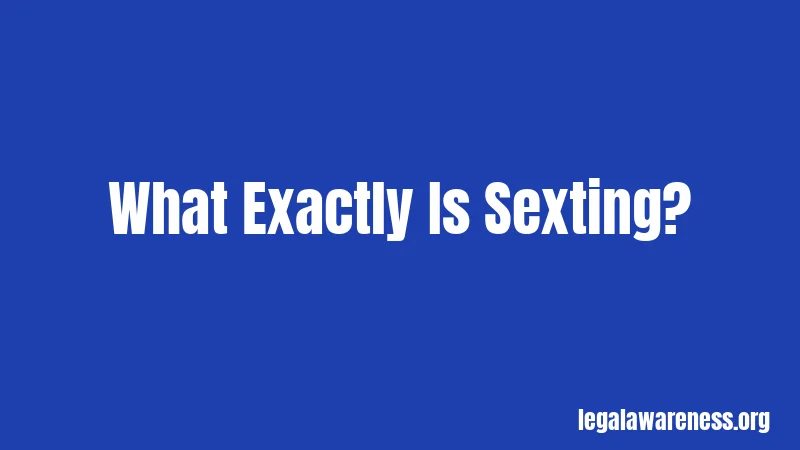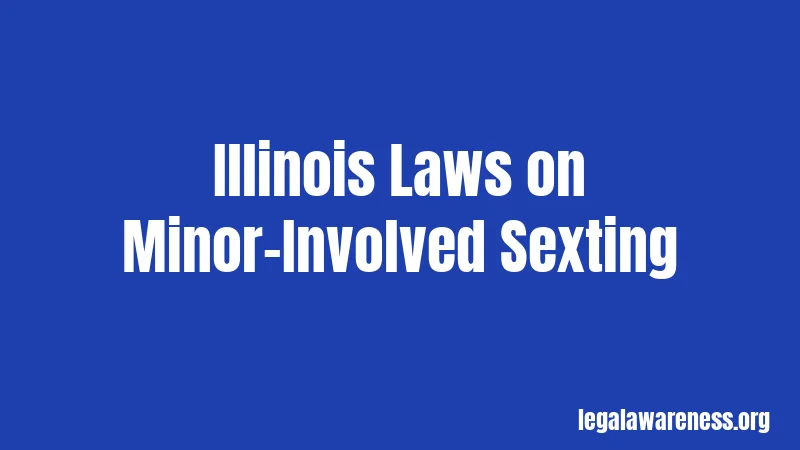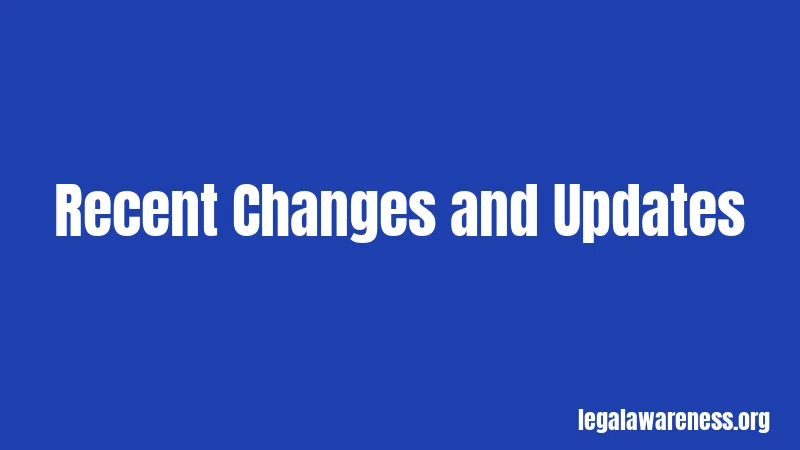Illinois Sexting Laws (2026): Know Before You Send
Most people don’t realize how serious sexting can get. Especially in Illinois. A text that seems harmless in the moment can turn into real legal trouble. We’re talking fines, criminal records, and more.
Here’s what you actually need to know about Illinois sexting laws. This guide breaks down what’s illegal, who it affects most, and what the penalties really look like.
What Exactly Is Sexting?

Okay, let’s define this clearly. Sexting means sending, receiving, or possessing sexually explicit photos, videos, or messages. Pretty straightforward, right?
In Illinois, the law takes sexting seriously. The rules change depending on who’s involved. If everyone is an adult, it’s one story. If minors are involved, it becomes way more serious.
The reason these laws exist? They’re trying to protect young people. They’re also trying to prevent the spread of explicit material. Makes sense when you think about it.
The Basic Illinois Sexting Laws
Sexting Involving Minors
Here’s where it gets important. If you’re a minor creating, sending, or possessing sexually explicit photos, you’re breaking the law in Illinois. Even if you’re sending them to someone your age. Even if you’re sending them to a boyfriend or girlfriend.
This catches a lot of young people off guard. You might think it’s okay between friends. Illinois disagrees. The law says minors cannot legally send, receive, or possess these images. Period.
Now, here’s what many people miss. Illinois actually has a more lenient approach for minors compared to many states. It recognizes that teenagers make mistakes. The consequences are different for young people than they are for adults.
Sexting Involving Adults
Adults face much stricter penalties. If you’re 18 or older and you send, receive, or possess sexually explicit images of a minor, you’re committing a crime. This is serious stuff.
Even sharing between consenting adults can have legal issues in Illinois. If you’re sending explicit images and someone didn’t ask for them, that could be harassment. If you share someone’s intimate images without permission, that’s also illegal.
Illinois has a “revenge porn” law. This makes it illegal to share intimate images or videos of someone without their consent. Think before you share anything private about another person.
Illinois Laws on Minor-Involved Sexting

For Minors Creating or Sending Images
Illinois recognizes that kids make mistakes. So the law creates different categories depending on age and circumstances. A 17-year-old and an 18-year-old can face very different consequences for the same action.
Generally, if you’re a minor sending sexual images, you could face juvenile delinquency charges. You might end up in juvenile court instead of adult court. The records might be sealed after you turn 18. This is actually better than adult court, honestly.
But here’s the catch. If the images are shared widely or distributed without your permission, penalties increase. If adults are involved, everything gets worse.
For Adults Communicating with Minors
This is where Illinois gets really strict. If you’re an adult who asks a minor for sexual images, you’re committing a crime. If you send sexual images to a minor, that’s also illegal. This falls under online exploitation and grooming laws.
Adults who do this face felony charges. We’re talking years in prison, fines, and mandatory sex offender registration. This isn’t something Illinois takes lightly.
Wondering if a relationship age difference matters? It doesn’t. Illinois has age of consent laws, yes. But requesting sexual images from a minor is illegal regardless of the age gap between you two.
Penalties and Consequences
For Minors Sending Sexual Images
If you’re under 18 and you send sexual images of yourself, you could face juvenile delinquency charges. Penalties might include:
You could be placed on probation. You might face counseling requirements. In some cases, you could be ordered to attend educational programs about the dangers of sexting. Your parents could face fines up to $500.
Here’s what surprises most people: you could technically face charges under child pornography laws. Yes, even for photos of yourself. This sounds harsh, and honestly, it is. But many states, including Illinois, are moving toward more lenient juvenile approaches.
If images are distributed without your permission, consequences increase. If an adult was involved in taking or requesting the images, penalties jump significantly.
For Adults Sharing Sexual Images of Minors
Adults possessing, distributing, or creating sexual images of minors face federal charges. We’re talking 10 to 20 years in prison minimum. That’s not an exaggeration.
Fines can reach $250,000 or more. You’d be required to register as a sex offender for life. Your name goes on the public registry. Employers, landlords, and neighbors can find you.
If you’re charged with attempting to solicit images from a minor, penalties are still severe. Prison time, fines, and registration are standard.
For “Revenge Porn” or Non-Consensual Sharing
Illinois law against sharing intimate images without consent carries:
Fines up to $2,500 for a first offense. You could face up to one year in jail. For repeat offenses, fines increase and jail time increases. If the person suffers emotional distress, they can sue you for damages too.
This law protects everyone, not just minors. If someone shares your intimate images without permission, that’s illegal. You can report it and take legal action.
Recent Changes and Updates

Illinois has been updating its sexting and exploitation laws. The state recognizes that technology changes fast. Laws need to keep up.
In recent years, Illinois has focused more on protecting minors while reducing harsh juvenile penalties for young people. The idea is to help teens understand the consequences without destroying their futures through adult criminal records.
At the same time, Illinois has strengthened laws against adults who exploit minors. More resources go toward catching people who solicit or share images of minors.
Stay updated on these changes. Laws shift. What’s legal one year might not be legal next year. What carries juvenile penalties today might carry adult penalties tomorrow.
Special Circumstances and Exceptions
Consensual Relationships Between Adults
If you’re both adults and you exchange explicit images with consent, where do you stand? Legally, it’s complex. You own the images. You have the right to your own intimate photos.
But once you send them to someone else, you lose some control. That person could share them. They could use them in ways you don’t like. Illinois recognizes this problem.
That’s why the revenge porn law exists. The law protects you if someone shares your images without permission. You can sue. You can press charges.
Relationship Breakups
Here’s something that happens a lot. A couple exchanges intimate images. The relationship ends badly. One person threatens to share the images publicly.
That’s illegal in Illinois. It’s considered a threat, harassment, and a violation of the revenge porn law. The person making threats could face criminal charges and civil lawsuits.
If images actually get shared, that’s even worse. The person who shared them faces the penalties I mentioned earlier.
Reporting and Investigation
If you know about sexting involving minors, you can report it. You can contact:
The National Center for Missing and Exploited Children at CyberTipline.org. Local law enforcement. Illinois Department of Children and Family Services. School administrators if it involves school-age children.
Reports can be anonymous. Law enforcement takes these seriously. They have dedicated units investigating online exploitation.
How to Stay Safe and Compliant
If You’re a Young Person
Here’s the honest truth. Don’t send sexual images. Not to anyone. Not to someone you trust. Not to a boyfriend or girlfriend.
I know that sounds strict. But legally and practically, it’s the safest move. These images can spread faster than you think. They can damage your reputation. They can create legal problems.
If someone asks you to send sexual images, that’s a red flag. Even if they seem trustworthy. Adults asking minors for images are committing crimes. Tell a parent, school counselor, or law enforcement.
If you’ve already sent images, don’t panic. Talk to a parent or trusted adult. Consider reporting it to police if an adult was involved. The sooner you get help, the better.
If You’re An Adult
Respect other people’s privacy and consent. Don’t share intimate images without permission. Don’t ask minors for sexual images under any circumstances.
Think before you send anything explicit. Once it’s sent, it’s out of your control. Consider whether you’d be okay if that image ended up public.
If someone sends you unsolicited sexual images, delete them. Don’t share them. If it’s harassment, report it to police.
General Online Safety
Be careful about who you connect with online. People aren’t always who they claim to be. Adults sometimes pose as teenagers to exploit them.
Use privacy settings on social media. Don’t accept friend requests from strangers. Be cautious about video calls with people you don’t know well.
If something feels wrong, it probably is. Trust your gut. Tell an adult you trust.
Frequently Asked Questions
Can I get in trouble for sexting with my girlfriend or boyfriend if we’re both minors?
Yes, you can. Illinois law applies to minors sexting with other minors. However, juvenile court judges sometimes show more leniency between teenagers close in age. But legally, it’s still a crime. It’s better not to send images at all.
What if I delete the images? Can I still get in trouble?
Yes. Law enforcement can recover deleted images. They also rely on complaints and other evidence. Deleting something doesn’t erase the crime that already happened.
Can I be forced to register as a sex offender for sexting as a minor?
For minor-to-minor sexting, sex offender registration is unlikely. But for adults, yes, it’s automatic. Minors involved in adult exploitation could face it in extreme cases.
What happens if someone shares my intimate images without permission?
That person is breaking Illinois’s revenge porn law. You can report them to police and sue them in court for damages. Penalties include jail time and fines for them. You could receive financial compensation.
Is it illegal to sext if we’re both adults and consenting?
No law prevents consenting adults from exchanging intimate images. However, you still face risks. Someone could share your images. Someone could use them to blackmail you. Revenge porn laws protect you if that happens.
Final Thoughts
Illinois sexting laws exist to protect people. They’re especially designed to protect young people from exploitation and poor decisions. Understanding these laws helps you stay safe and avoid serious legal trouble.
Here’s what to remember: Think before you send anything intimate. Be respectful of others’ privacy and consent. If you’re a young person and someone asks for sexual images, tell a trusted adult immediately.
If you’re facing sexting charges or have questions about your specific situation, talk to a lawyer. Every case is different. Legal advice from a professional matters.
Stay informed, stay safe, and know that you’re not alone if you’ve made a mistake. Help is available.
References
Illinois Criminal Code Chapter 720 – Sexual Abuse Laws
National Center for Missing and Exploited Children – CyberTipline
Illinois Department of Children and Family Services
Illinois Attorney General – Internet Safety Resources
